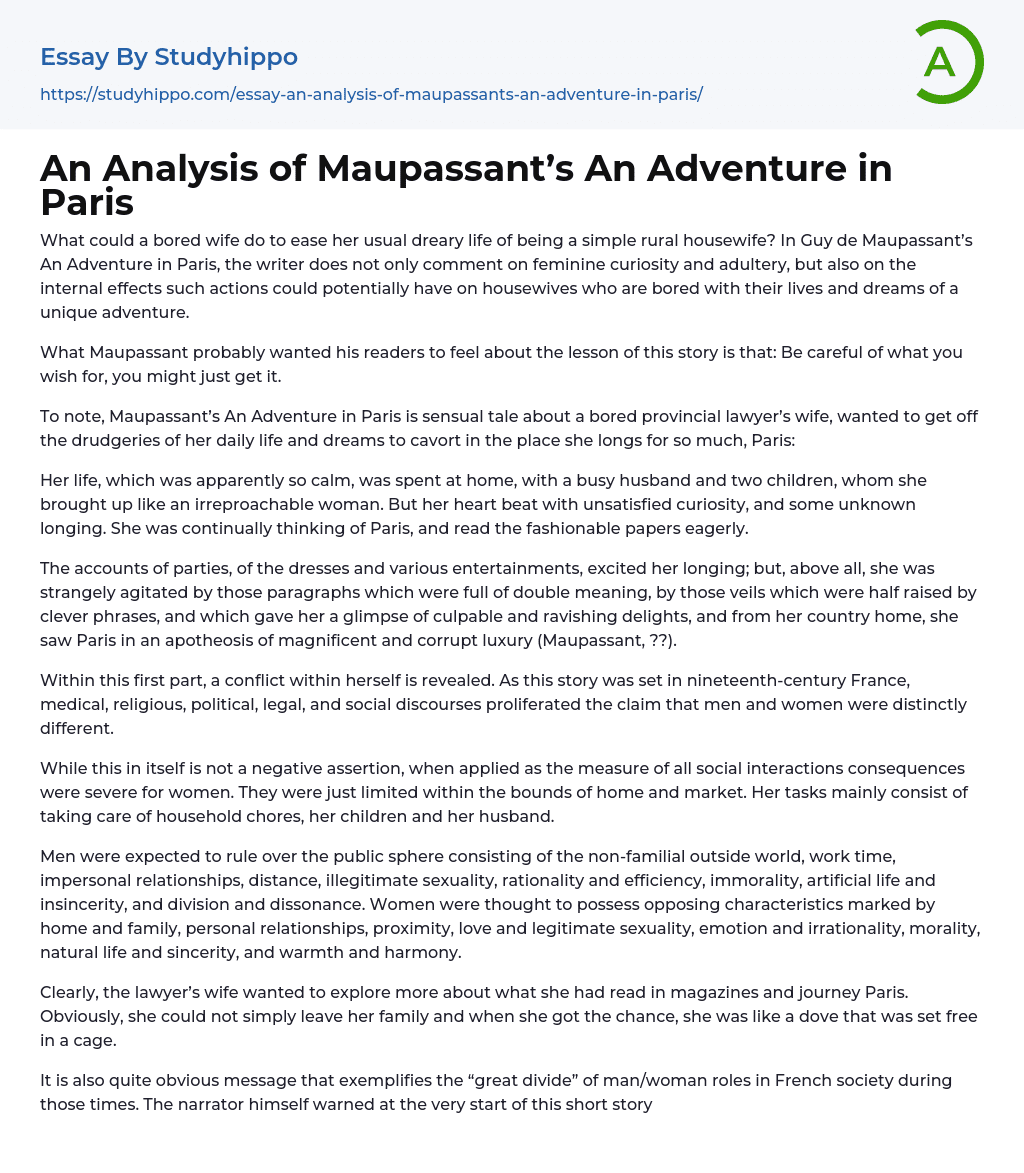

An Analysis of Maupassant’s An Adventure in Paris Essay Example
What could a bored wife do to ease her usual dreary life of being a simple rural housewife? In Guy de Maupassant’s An Adventure in Paris, the writer does not only comment on feminine curiosity and adultery, but also on the internal effects such actions could potentially have on housewives who are bored with their lives and dreams of a unique adventure.
What Maupassant probably wanted his readers to feel about the lesson of this story is that: Be careful of what you wish for, you might just get it.
To note, Maupassant’s An Adventure in Paris is sensual tale about a bored provincial lawyer’s wife, wanted to get off the drudgeries of her daily life and dreams to cavort in the place she longs for so much, Paris:
Her l
...ife, which was apparently so calm, was spent at home, with a busy husband and two children, whom she brought up like an irreproachable woman. But her heart beat with unsatisfied curiosity, and some unknown longing. She was continually thinking of Paris, and read the fashionable papers eagerly.
The accounts of parties, of the dresses and various entertainments, excited her longing; but, above all, she was strangely agitated by those paragraphs which were full of double meaning, by those veils which were half raised by clever phrases, and which gave her a glimpse of culpable and ravishing delights, and from her country home, she saw Paris in an apotheosis of magnificent and corrupt luxury (Maupassant, ??).
Within this first part, a conflict within herself is revealed. As this story was set in nineteenth-century France, medical, religious
political, legal, and social discourses proliferated the claim that men and women were distinctly different.
While this in itself is not a negative assertion, when applied as the measure of all social interactions consequences were severe for women. They were just limited within the bounds of home and market. Her tasks mainly consist of taking care of household chores, her children and her husband.
Men were expected to rule over the public sphere consisting of the non-familial outside world, work time, impersonal relationships, distance, illegitimate sexuality, rationality and efficiency, immorality, artificial life and insincerity, and division and dissonance. Women were thought to possess opposing characteristics marked by home and family, personal relationships, proximity, love and legitimate sexuality, emotion and irrationality, morality, natural life and sincerity, and warmth and harmony.
Clearly, the lawyer’s wife wanted to explore more about what she had read in magazines and journey Paris. Obviously, she could not simply leave her family and when she got the chance, she was like a dove that was set free in a cage.
It is also quite obvious message that exemplifies the “great divide” of man/woman roles in French society during those times. The narrator himself warned at the very start of this short story about how a woman’s curiosity led to her guilt:
When once a woman's eager curiosity is aroused, she will be guilty of any folly, commit any imprudence, venture upon anything, and recoil from nothing. I am speaking of women who are really women, who are endowed with that triple-bottomed disposition, which appears to be reasonable and cold on the surface, but whose three secret compartments
are filled (Maupassant, ??).
Agreeably, Maupassant’s An Adventure in Paris offers more to its readers than an entertaining read about a female character who commits adultery. In fact, this story can be classified as more on the masculine narrator’s perception of the protagonist and her embodiment of curious women than on the sexual act itself.
It is observable that the narrator’s authoritative male voice shadows the overarching ideology concerning female sexuality in nineteenth-century France: curious women are dangerous and they should be controlled.
- Values of Life essays
- Ethical dilemma essays
- Normative Ethics essays
- Virtue Ethics essays
- Belief essays
- Deontology essays
- Moral essays
- Virtue essays
- Work Ethic essays
- Acceptance essays
- Age Of Enlightenment essays
- Child Observation essays
- Confucianism essays
- Conscience essays
- Critical Reflection essays
- Destiny essays
- Determinism essays
- Empiricism essays
- Environmentalism essays
- Epistemology essays
- Ethics essays
- Ethos essays
- Existence essays
- Existentialism essays
- Fate essays
- Free Will essays
- Functionalism essays
- Future essays
- Good And Evil essays
- Human Nature essays
- Individualism essays
- Meaning Of Life essays
- Metaphysics essays
- Natural Law essays
- Personal Philosophy essays
- Philosophers essays
- Philosophy Of Life essays
- Political Philosophy essays
- Pragmatism essays
- Reality essays
- Relativism essays
- Teaching Philosophy essays
- Time essays
- Transcendentalism essays
- Truth essays
- Utilitarianism essays
- Adult essays
- Aggression essays
- Altruism essays
- Archetype essays



